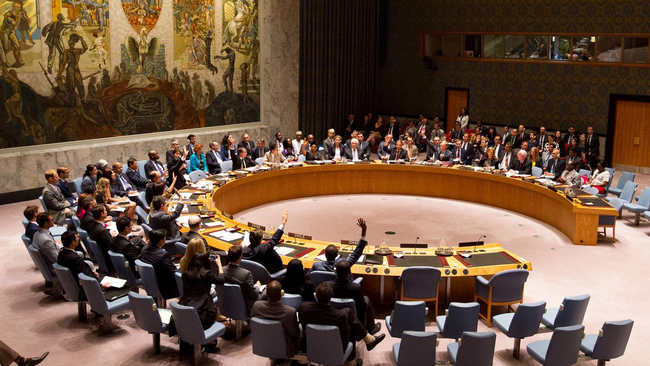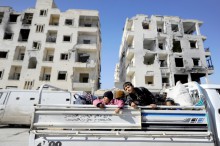This week Russia and China vetoed the UN Security Council’s resolution on a 7-day ceasefire in Aleppo, Syria’s largest city before the war. This is the sixth and the fifth time Moscow and Beijing, respectively, have vetoed a Syria-related resolution since an armed conflict broke up there in 2011.
The document was put forward by Egypt, Spain, and New Zealand. The resolution provided for a 7-day truce in Aleppo in order to evacuate sick and wounded civilians from the rebel-controlled part of the city and deliver humanitarian aid to the blocked areas. Besides, the document called for ceasing fire all over Syria and resuming the political efforts to settle the situation in that country.
Ukraine was one of the 11 Security Council members that voted for the resolution. Volodymyr Yelchenko, Permanent Representative of Ukraine at the UN, leveled sharp criticism at the Russian side. He particularly emphasized that Russia and the Syrian regime it supports were bombing the civilian population under the guise of combating terrorism. Besides, the Ukrainian permanent representative compared the situation around Aleppo with what Russia is doing in eastern Ukraine. “Russia applies the same methods in the Donbas as it does in Syria – first it unleashes aggression and then tries to be an intermediary,” Yelchenko stressed.
British UN Ambassador Matthew Rycroft believes that the Security Council is being held hostage. “Russia and China have chosen to veto not because of a lack of consultation, but because of their long-standing, misplaced faith in a despot who has killed nearly half a million of his own people,” he said.

DECEMBER 5, 2016, NEW YORK. ELEVEN SECURITY COUNCIL MEMBERS, INCLUDING UKRAINE, VOTED FOR THE RESOLUTION. RUSSIA, CHINA, AND VENEZUELA VOTED AGAINST, WITH ANGOLA ABSTAINING / REUTERS photo
Meanwhile, New Zealand UN Ambassador Gerard van Bohemen said the failure to act was “deeply damaging to the council’s reputation and catastrophic for the people of Syria.”
The Day requested Volodymyr VASYLENKO, Doctor of Law, Ukraine’s representative at the UN Human Rights Council (2006 to 2010), authorized representative of Ukraine at the International Court of Justice (2001 to 2006), to say what the international community can do in this situation to force Russia to observe international law norms in both Syria and Ukraine, instead of creating problems in the world and then trying to be an intermediary.
“WESTERN DEMOCRACIES MUST SHOW THAT THEY KNOW HOW TO APPLY SANCTIONS AGAINST RUSSIA”
“The Security Council cannot resolve this program because of Russia’s veto. Yet it is possible to use mechanisms of the UN General Assembly that could pass a necessary resolution. But in this case we run the risk of being unable to garner the sufficient number of votes because Russia has an impact on very many small states. It happens, for example, that 50 or 30 countries pass a resolution and the rest abstain, but in this case the resolution carries no weight and will not be fulfilled.
“On the other hand, if a resolution gains a considerable number of votes, it can be considered as grounds for imposing sanctions. This can occur if the initiators of this resolution manage to find a large number of coauthors and to make sure that the overwhelming majority of UN member states support it. For example, the General Assembly managed to pass a resolution on effective sanctions against the South African Republic.
“If the West is serious about defending its interests (and the problem is not only in Syria, for Russia breaches the international law and order wherever it can), it should support the formation of an anti-Putin coalition. Western democracies must show that they know how to apply sanctions against Russia without resorting to UN mechanisms and thus force it to meet its obligations in line with the UN Charter.
“Indeed, many are talking today about the UN’s inefficiency in resolving international conflicts. Let us recall that the League of Nations proved to be inefficient shortly before World War Two. And it is due to the excessive hopes that were pinned on the League of Nations and the inactivity of Western leaders that WWII broke out. And only in 1941, in the course of the war, the Atlantic Charter was signed and an anti-Hitler coalition was formed. Western civilization had to sustain colossal losses to victoriously end the war.
“Now, too, not to allow a similar situation to emerge, Western leaders must form an anti-Putin coalition right now and employ preemptive tactics. As far as the military, economic, scientific, technological, and demographic potential is concerned, the might of Western democracies largely exceeds that of Russia.
“Moscow will never dare to use nuclear weapons or go to war against the Western world if the latter unites. Without pinning excessive hopes on the UN, we should still try, of course, to revitalize and use these structures. But if this does not work, it will be necessary to act jointly against the state that brazenly breaches the international law and order. And this will in fact mean observation, not violation, of the UN Charter.”
“IMPUNITY ENCOURAGES THE KREMLIN TO TAKE FURTHER AGGRESSIVE ACTIONS”
“NATO can make a decision on the West’s rapid intervention in any conflict, but this requires political will. As is known, in the Alliance decisions are made not by the secretary general or his deputies but in the capitals of member states.
“NATO has already declared the policy of containing Russia, but its policy must be to counteract and force Russia to restore the international law and order. What is needed is a policy that would clearly show Russia its place in the world and demand that it never breach the international law and order in the future.
“Given political will, the West can force Russia, even bypassing the UN, to restore the international law and order and bear responsibility for breaching it in Ukraine, Syria, and Georgia, where it also committed acts of aggression.
“I think it is the only real way to avert even graver dangers in the future. For Russia’s impunity and the West’s unwillingness to run the risk of a conflict with Russia only encourage the Kremlin to take further aggressive actions.
“Russia’s aim is to ruin the overall law and order, the European Union, the links between the US and Europe, and to create the atmosphere of uncertainty and chaos in the world. Western democracies are used to existing in the conditions of law and order because they are guided in their domestic and foreign policies by the force of law, not by the law of force. On the contrary, Russia is guided in its policies by the right of being strong, not by the force of law.
“For this reason, there is a disparity here between the philosophy and values of the Western world and those of Russia. This disparity is in fact not to the benefit of the West, for it undermines the foundations of Western civilization. Unfortunately, Western civilization does not have today any leaders like Truman, Churchill, de Gaulle, Thatcher, and Reagan. So the Western world is now amorphous for lack of leadership. It is time to come to one’s senses, and there are many people among the Western governmental elite, who are aware of the threat Russia poses to the world, not only to Ukraine. They must make at last a wise political decision on repelling Russia’s aggression. Taking into account that there are certain logistical structures in the West, it is possible even under the present conditions, if there is political will, to force Russia to act in compliance with the norms of international law and without involving any UN structures.”








